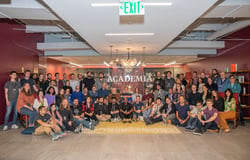Job Description:
Summary
This individual will have four major duties: 1) performing and advising lab members on molecular biology experiments, especially pertaining to cell-extraction for transcriptomic experiments, 2) analyzing and interpreting transcriptomic data, 3) coordinating cell-extraction and transcriptomic experiments across multiple labs, 4) Drosophila husbandry, maintenance and genetics.
The Kaun Laboratory uses molecular and genetic tools available in the fruit fly Drosophila melanogaster to investigate the neural substrates of memory, reward, and addiction at the molecular and cellular level. The Laboratory’s goal is to develop the fly as a model to study more complex behavioral aspects associated with addiction. A multi-tiered approach is used to understand the genes, molecules, and neural circuits underlying these complex behaviors. A combination of molecular biology and bioinformatics is utilized to understand the molecular mechanisms through which memory circuits respond to drugs of abuse. An interdisciplinary approach is used that combines molecular genetics with behavioral analysis to understand the in vivo mechanism of memories at the level of individual circuits and their component cells.
This position has a fixed term end date of one year from date of hire, which may be extended based upon availability of funding.
Qualifications
Education and Experience
-
Required: Bachelor’s degree in Neurobiology, Molecular Biology, Biochemistry or related science
-
Required: 1-2 years related research experience working in an organized biology research laboratory
-
And/or equivalent combination of education and experience
Job Competencies
-
Knowledge of experimental planning and design
-
Proficiency in nucleic acid and protein extraction from cells and tissue
-
Proficiency in protein extraction from cells and tissue, and associated qualitative and quantitative analysis
-
Familiarity with genome database analysis
-
Familiarity with cloning for the purpose of generating transgenic lines and use of CRISPR/Cas9 for making transgenic animals
-
Ability to perform or willingness to learn behavior tracking data visualization and analysis
-
Maintain agreed upon day-time work hours to allow for assistance of experiments for lab members
-
Good written and verbal communication skills
-
Ability to collaborate on projects
-
Dependability and accuracy in work
-
Possesses a willingness and ability to support a diverse and inclusive campus community
CRIMINAL BACKGROUND AND EDUCATION CHECK REQUIRED
Note: This position is not eligible for Visa sponsorship from Brown University
Benefits of Working at Brown:
Information on the Benefits of Working at Brown can be found here.
Recruiting Start Date:
2024-09-09
Job Posting Title:
Research Assistant
Department:
Department of Neuroscience
Grade:
Grade 8
Worker Type:
Employee
Worker Sub-Type:
Fixed Term (Fixed Term)
Time Type:
Full time
Scheduled Weekly Hours:
37.5
Position Work Location:
Onsite
Submission Guidelines:
Please note that in order to be considered an applicant for any staff position at Brown University you must submit an application form for each position for which you believe you are qualified. Applications are not kept on file for future positions. Please include a cover letter and resume with each position application.
Still Have Questions?
If you have any questions you may contact [email protected].
EEO Statement:
Brown University is an E-Verify Employer.
As an EEO/AA employer, Brown University provides equal opportunity and prohibits discrimination, harassment and retaliation based upon a person’s race, color, religion, sex, age, national or ethnic origin, disability, veteran status, sexual orientation, gender identity, gender expression, or any other characteristic protected under applicable law, and caste, which is protected by our University policies.
Top Skills
What We Do
Located in historic Providence, Rhode Island and founded in 1764, Brown University is the seventh-oldest college in the United States. Brown is an independent, coeducational Ivy League institution comprising undergraduate and graduate programs, plus the Alpert Medical School, School of Public Health, School of Engineering, and the School of Professional Studies.
With its talented and motivated student body and accomplished faculty, Brown is a leading research university that maintains a particular commitment to exceptional undergraduate instruction. Brown’s vibrant, diverse community consists of about 6,200 undergraduates, 2,000 graduate students, 490 medical school students, more than 5,000 summer, visiting, and online students, and over 700 faculty members.
Brown students come from all 50 states and more than 115 countries. Undergraduates pursue bachelor’s degrees in more than 70 concentrations, ranging from Egyptology to cognitive neuroscience. Anything’s possible at Brown—the university’s commitment to undergraduate freedom means students must take responsibility as architects of their courses of study.
Brown University has 51 doctoral programs and 28 master’s programs. The broad scope of options vary from interdisciplinary opportunities in molecular pharmacology and physiology to a master’s program in acting and directing through the Brown/Trinity Repertory Consortium.
Around the world, nearly 90,000 Brown alumni are - in the words of Brown’s charter - leading lives of “usefulness and reputation” in every imaginable field of endeavor. Through events around the globe, reunions on campus, career resources, a host of online connections, and other services, the Brown Alumni Association fosters and supports a vibrant alumni community, wherever its members may be








